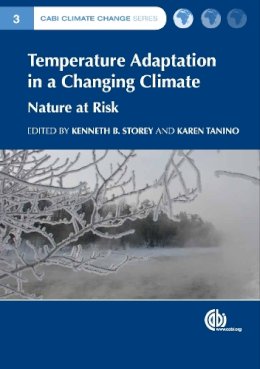
Stock image for illustration purposes only - book cover, edition or condition may vary.
Temperature Adaptation in a Changing Climate
Kenneth B. Storey
€ 132.54
FREE Delivery in Ireland
Description for Temperature Adaptation in a Changing Climate
Hardcover.
Temperature adaptation is a much neglected field in the minds of climate change researchers and policy makers. However, increasing fluctuations in temperature mean that the risk of cold and heat stress will pose an increasing threat to both wild and cultivated plants and animals, with frost injury expected to cause devastating damage to crops on an increasingly large scale. Thus, improving shared knowledge of the biological mechanisms of temperature adaptation in plants and animals will help prevent major losses of crops and genetic resources in the future.
Temperature adaptation is a much neglected field in the minds of climate change researchers and policy makers. However, increasing fluctuations in temperature mean that the risk of cold and heat stress will pose an increasing threat to both wild and cultivated plants and animals, with frost injury expected to cause devastating damage to crops on an increasingly large scale. Thus, improving shared knowledge of the biological mechanisms of temperature adaptation in plants and animals will help prevent major losses of crops and genetic resources in the future.
Product Details
Format
Hardback
Publication date
2012
Publisher
CABI Publishing United Kingdom
Number of pages
248
Condition
New
Number of Pages
248
Place of Publication
Wallingford, United Kingdom
ISBN
9781845938222
SKU
V9781845938222
Shipping Time
Usually ships in 7 to 11 working days
Ref
99-1
About Kenneth B. Storey
Kenneth B Storey (Edited By) Dr. Kenneth B. Storey, Ph.D., F.R.S.C., is a Professor of Biochemistry at Carleton University in Ottawa and holds the Canada Research Chair in Molecular Physiology. He received his B.Sc. from the University of Calgary and his Ph.D. from the University of British Columbia. Ken is a world leader in the field of biochemical adaptation. He uses tools of enzymology, protein chemistry and molecular biology to identify the adaptations of gene regulation and enzyme structure/function that support amazing animal phenomena including hibernation, freezing survival, estivation and anoxia tolerance. Ken is a prolific author and speaker - he has over 600 publications to his name and has given hundreds of talks around the world. Recently Ken won the 2010 Flavelle medal in Biological Sciences from the Royal Society of Canada and the 2011 Fry medal from the Canadian Society of Zoologists. Karen K Tanino (Edited By) Dr. Karen Tanino, Ph.D. is a Professor of Plant Sciences at the University of Saskatchewan. She chairs the Northern Agriculture Thematic Network, University of the Arctic (a consortium of over 121 institutions circumpolar) and holds an Adjunct Professorship with IWATE University, Morioka, Japan. She received her B.Sc. and M.Sc. from the University of Guelph and her Ph.D. from Oregon State University. Karen examines physiological mechanisms of plant adaptation against abiotic stress from the whole plant to cellular level. She has published over 140 research contributions including 4 books. Enhanced learning approaches are used throughout the 14 undergraduate, graduate and diploma courses that she has taught. She has coordinated graduate level courses in plant abiotic stress in Japan, Russia, Canada, Luxembourg and Poland. Since 2002, she has chaired/co-chaired 5 international and national conferences and was a core organizing committee member of ten international conferences.
Reviews for Temperature Adaptation in a Changing Climate
